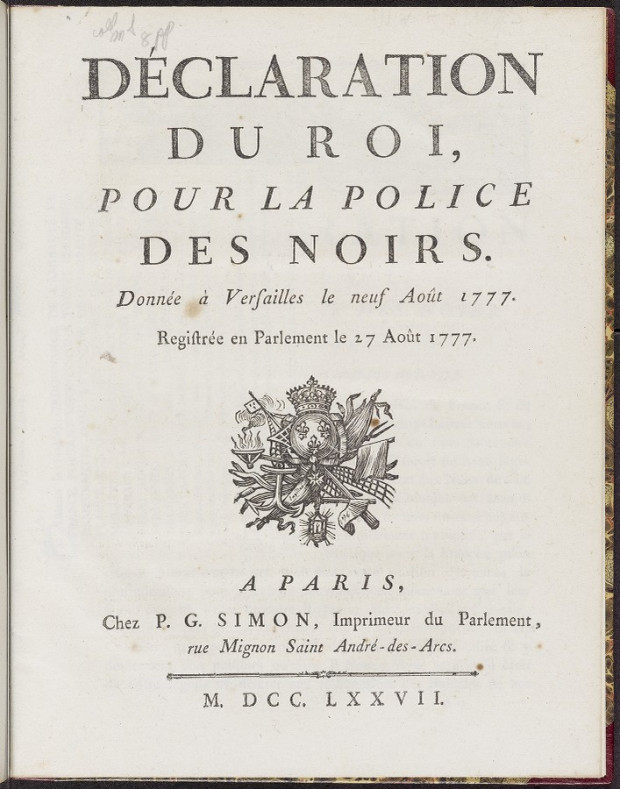Immigration, empire and boosting the birth rate

An interview with Alexandra Schultz, author of ‘”The purity of the blood”: Poncet de la Grave, pronatalism and empire’ 25:1 (2017).
What does this article tell your readers about modern and contemporary France?
In this article I hope to relate to readers the fascinating but largely unknown career of Guillaume Poncet de la Grave (1725-1803), who worked during the Ancien Régime as the monarchy’s representative to the admiralty court (procureur du roi) for both Louis XV and Louis XVI. During the Ancien Régime he was interested in limiting the immigration of people of color to France, and at the same time, he lobbied to expand France’s empire. At the turn of the century, under Napoleon, he wrote a tract urging the French populace to make more efforts to produce more citizens, and in the process, guard the “purity of the [their] blood” against foreign cultural influence and domestic immorality. He proposed extensive and dramatic pronatalist legislation designed to achieve this.
What key themes do you address and how does your argument build upon and differ from existing arguments in the field?
I have long been interested in Poncet de la Grave ever since learning about him in Sue Peabody’s There are No Slaves in France: The Political Culture of Race and Slavery in the Ancien Régime. (Oxford: Oxford University Press, 1996). Peabody brought to my attention the archival sources relevant to and Poncet de la Grave’s early career and role in drafting the infamous Police des Noirs (the 1777 law limiting the entry of people of African descent in France), but since her work centered round the Ancien Régime there was not much on his later career. I began to locate the available political tracts he had published and there were many, as he was a prolific writer. The book I found most interesting was his Reflections on the Unmarried, concerned with increasing French reproduction. As someone deeply fascinated by questions of nationalism, race, and empire, I wanted to explore the ways in which Poncet de la Grave’s passion for expanding the French empire meant, to him, the need to find a way to raise the birthrate intersected with his fears of how new cultural contacts might thwart that objective.
What kinds of methodologies did you use?
I found Etienne Balibar’s “The Nation Form”, in Race, Nation, Class: Ambiguous Identities (Etienne Balibar and Immanuel Wallerstein, London and New York: Verso, 1991. Trans. Chris Turner. Pp. 86-106.) extremely helpful from a theoretical standpoint for a great deal of my research. Balibar’s argument that the principle of a shared national “invariant substance” becomes more and more necessary in the context of a rapidly expanding modern global economy. I am eager to find narratives that demonstrate this phenomenon:
the more importance and energy France devoted to imperial expansion, the more men like Poncet de la Grave worry about guarding and maintaining a “pure” French nation. It seems at first like a paradox, but of course in the context of power relationships it makes sense that there is this endless energy expended on defining who will be the beneficiaries of empire and who will simply serve its aims.
Poncet de la Grave wanted to intrude on the most intimate aspects of people’s lives to augment French power.
How does this article fit into your previous/ current/ future research?
I hope to further research Poncet de la Grave’s career at some point, and I am particularly interested in what he was doing during the most radical part of the Revolution in the early 1790s. I will need more time to conduct extensive archival research to explore his activity and trace his whereabouts further. I hope that this article will possibly lead to more information as well, as those interested in this intriguing individual can contact me to discuss his unique contribution to the history of race, empire, and pronatalism in France. I am also committed to deeper and more extensive analysis of Revolutionary era sources that are concerned with the French empire and that touch on the themes that Poncet de la Grave’s did: race, sexuality, gender and childbirth. I believe it is there that we can begin to more fully understand the ways that modern nationalism drew on these themes in order to draw its mythical boundaries.
Hero Image – Front cover of “La police des Noirs” (1777), held at the Princeton University Digital Library
